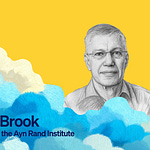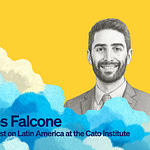Free speech is increasingly threatened in the United States, especially on college campuses. Cultural norms around free expression seem to be eroding, and speech is sometimes compared to—and even met with—violence, such as in the recent assassination of Charlie Kirk.
In this episode of The Human Progress Podcast, Sarah McLaughlin, a senior scholar at The Foundation for Individual Rights and Expression, joins Chelsea Follett to discuss another threat to campus speech: the rising influence of foreign authoritarian governments.
Please note that we recorded this interview before Kirk’s murder, so he is not mentioned, though we believe that event makes conversations like this one even more relevant.
Below is an edited and abridged transcript featuring some highlights from the interview.
Joining me today is Sarah McLaughlin, a senior scholar in Global Expression at the Foundation for Individual Rights and Expression. She has a new book out entitled Authoritarians in the Academy: How the Internationalization of Higher Education and Borderless Censorship Threaten Free Speech, which examines how higher education has entangled institutions with censorship demands here in the United States.
Before we dive into the book and its arguments, let’s zoom out to the big picture. Why does freedom of speech even matter? What does it do for humanity, democracies, scientific advancement, and progress?
A lot of political and social movements that have helped protect our rights were only possible because people could speak their minds and draw attention to problems. Free speech also acknowledges a certain humility: human beings are fallible, and we need to be able to question what everyone else believes to be true. If you don’t have that freedom, it becomes very difficult to advance human knowledge.
I also believe that human beings have an innate need for freedom of expression. If we don’t have the ability to express ourselves, it really stunts our growth and limits who we are and what we can become. So, it’s important both for societal and individual development.
My understanding is that FIRE is a nonpartisan organization. Why hasn’t your organization aligned itself with a political party?
I think being nonpartisan is the best way to protect freedom of expression. If you start picking and choosing whose rights you want to defend, you’re not really defending the principle of freedom of expression; you’re just defending political views that you agree with.
I think sometimes Americans who are wary about free speech have this idea that it’s a limited resource, that if some people have it, that means others don’t. But that’s not really how it works. In fact, the more people it’s protected for, the more we can ensure it stays protected for everyone. If you defend one group, you’re actually not hurting your own cause: you’re helping it in the long run.
Let’s move on now to your book. What inspired you to write Authoritarians in the Academy?
For the first few years that I was at FIRE, I was mainly working with students and professors because, for most of its history, FIRE only worked on campus free expression cases. We recently expanded, but at that point, we were only doing campus work. You could probably guess what a lot of these cases were about. Speech about abortion, guns, race, and Israel—the standard starting points of censorship and controversy. But over time, I began hearing more and more about people who felt like they couldn’t speak freely about foreign authoritarian governments. Most often, the Chinese government, but there were also problems arising from universities’ relationships with the Gulf States.
When an industry becomes global, it also becomes vulnerable to pressure from foreign governments. Viewers have probably seen stories about the sometimes-outlandish apologies that companies have issued to the Chinese government because they accidentally mentioned Tibet or Hong Kong. But when higher education is a global industry, there are really unique concerns that emerge. As I mentioned earlier, freedom of expression is essential for the production of knowledge, which is one of the main purposes of higher education. If higher education is not a place where people can speak openly about foreign authoritarian governments, what does that mean for global discourse and research?
Could you tell me about some of the incidents that you witnessed?
One of the more disturbing examples I’ve seen was in 2022 at George Washington University in DC.
There was a group of students who put up posters ahead of the Beijing Winter Olympics that were meant to criticize human rights abuses in China, and some student groups complained to the university, saying that the posters were offensive, hurtful, that they insulted China, and that the university needed to act. To my surprise and the surprise of many, the university did. The university president at the time said he was personally offended by the posters and that he was going to take them down and conduct an investigation to find the students who posted them.
Can you describe in more detail the content of these posters?
They were not particularly graphic. They were actually designed to look like promotional posters for the games, but when you got closer, you realized that it was kind of faceless, anonymous members of China’s team engaged in surveillance or violence, the implication being that this is what the Chinese government does to minorities in its country.
To be clear, the president of George Washington University, after he received criticism, relented and admitted he made a mistake. And that’s a good thing: university leaders need to be able to acknowledge when they’ve made a mistake. But I wrote about it at the time, and I pointed out that if any of the students who put up the posters were international students from China, the university would have been using its own staff to unmask critics of the Chinese government and put them in really serious legal peril. So it’s not just about taking down posters. It’s about students from a foreign country who, after expecting to be able to speak their mind, ended up at risk of serious legal trouble at home.
This is a major fear for dissident students here in the United States. If you are a vocal critic of the Chinese government, there’s a very good chance that, at a minimum, your family will receive threats and visits from Chinese officials. I’ve spoken to students who have faced exactly that. Some of them have courageously come forward under their real name and said, “my father was brought in for questioning because I attended a protest here in the United States.” So that’s something universities need to be aware of. They have large numbers of international students with very specific and unique threats to their free speech, and the universities need to make sure that they are helping protect those students, not helping repress them.
Let’s try to understand the incentives that are driving this kind of cooperation with authoritarian regimes. Why do you think the president of George Washington University initially supported tearing down these posters?
I think when universities receive reports from students about offensive speech on campus, their reflex is to respond to their concerns. But that’s something that needs to be treated with care. There is a trend of students who support foreign authoritarian governments making bad faith claims that certain speech is offensive and that the university needs to censor it. I have examples in the book of students calling for the censorship of speakers who are coming to talk about being victims of horrific abuse by the Chinese government, by claiming it is hate speech. So that’s part of it.
There’s also a broader question of universities’ relationships with China. Part of it is international students, but another part of it is the funding that universities have been pursuing. Universities are seeing themselves more and more as businesses rather than institutions of academic freedom and free expression. There was a pretty disturbing example from about a decade ago at Harvard Law, where a visiting Chinese scholar intended to hold an event about human rights in China, and a vice dean at Harvard Law contacted him and said, “I don’t want you to hold this event because it’s going to coincide with a trip that Harvard’s president is making to China to work on the university’s relationships there.” So I think sometimes you can see business decisions being made at the cost of academic freedom and freedom of expression.
Now that we’ve talked a bit about China, can you also provide some examples of censorship in academia related to the Gulf States?
Absolutely. So, universities have been looking abroad for funding because there have been a lot of funding challenges here in the US. And they’re looking in wealthy nations, including Qatar and the UAE. So, there’ve been a lot of satellite campuses popping up in Qatar and the UAE from American universities. That isn’t necessarily a bad thing. It’s good for people to work together and share knowledge across borders. But it’s also important to be transparent about what is actually happening on the ground on those campuses.
One of the more disturbing examples was a few years ago, on Northwestern’s Qatar campus, when they invited a rock band to an event on campus. The lead singer of that event is openly gay, and so they soon cancelled the event because of “ security concerns.” But the Qatar Foundation, which is a state-linked institution that funds these universities, came out and they said, “That’s not what happened. This event was canceled because it didn’t accord with Qatari laws and social customs.” So, universities are opening these campuses and making very flowery promises about freedom of expression, but they’re not willing to talk about the chasm between their commitments to free expression and local laws.
When universities are not transparent about these issues, it allows these authoritarian countries to point to these institutions and say, “If our country were so illiberal and censorious, would we really have an American institution opening up here?” It’s a major PR victory for these countries.
Can you talk about how those in higher education can fight against this rising censorship and authoritarian influence?
There are a lot of different ways.
First, university administrators need to reinvestigate their dealings abroad. That doesn’t mean that they need to end them, but they do need to reconsider the basis on which they started them. A lot of universities started this engagement 15 to 20 years ago, and the sad truth is, China and some of these other countries have significantly worsened over that time period, so the political environment in which you opened up a satellite campus in 2005 might not be the same one as today. They need to consider whether those programs are still appropriate, as well as whether there are adequate protections on the ground for academics. I think they also need whistleblower protections because a lot of the academics I spoke to very understandably feel that if they spoke out about these censorship issues at their campuses, they would be fired, and this is in a field where jobs are scarce.
When it comes to international students, make sure they understand what their rights are. They should be making sure students know what resources are available to them if they feel like the Chinese government is knocking at the door. Alumni should also be getting involved and pressing their universities to take this issue seriously. And when it comes to legislators and politicians, we need to encourage them to pursue speech policies that are not destructive to either the rights of immigrants or Americans.
Absolutely. And if people are curious how their own university measures up in terms of freedom of expression, I believe that your organization provides some tools to help them do that.
Yes, the FIRE has rankings, and we also look at university speech codes, so people can go and get a good sense of how free their campus is and what policies need to be changed. And FIRE’s policy reform team does a fantastic job of working with universities to try to revise these policies at both public and private universities. So, if you think your university has a speech code that needs reform, give us a call and we’ll be happy to help.
Thank you so much for highlighting these stories. I think it would be very tragic if universities lost their tradition of freedom of speech, because historically they’ve been so important to scientific progress and the advancement of knowledge, and there do seem to be some very troubling trends.
However, because this is The Human Progress Podcast, we usually try to end on a positive note. Are there any trends that you’ve seen that give you hope for the future of freedom of speech on university campuses?
The situation for free expression is definitely troubling in the United States right now, but I’m hopeful that people will start to see why freedom of expression is so important, why it’s so necessary, and that we can take this moment to fight back for our rights.
Something I say in the book is that free campuses are a building block of free societies. So, I think if we figure out a way to better defend and protect our rights there, we will better defend our rights in civil society more broadly. That’s as hopeful as I can be.










